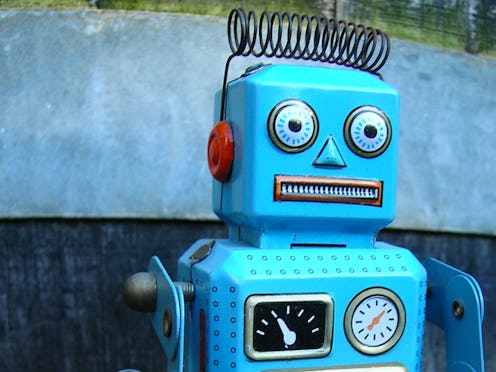Life
A Library Told This Girl Robotics Is A "Boy" Class

Recently Cash Cayen, a 9-year old in Timmins, Ontario, tried to register for a special program on robotics at her local library, only to be told that she wouldn’t be allowed to attend. The reason? She’s a girl, and the library’s robotics program was for boys only. Head, meet desk. In response, Cayen began a Change.org petition to allow girls into the class. Over 28 thousand signatures later, Cayen has gotten her wish, and the Timmins Public Library has announced in a letter that the “event will be open to all children between the ages of 9 -- 12.”
In her petition on Change.org, Cayen explains her motivations:
Because today I tried to register for the robotics session that our local library is offering and was refused based on the fact that I am a girl. Even after speaking to the Assistant Library Director Elaine De Bonis, where I explained that I have been participating in library programming since I was only a few months old I was still turned away. Mrs De Bonis explained to me that boys academic and literacy skills don't improve over the summer break therefore this program would only be offered to boys. She said I could be added to a waiting list and if enough girls showed interest they could possibly look into offering it to girls in the future. I explained that it was unfair that I was being denied this opportunity simply because I am a girl, but she insisted I could not register.
I assume that the assistant library director’s argument that the course is aimed toward boys because “boys academic and literacy skills don't improve over the summer break” is a reference to studies that have shown (both in the U.S. and Canada) that boys tend to read less outside of the classroom than girls, which leads to lower reading proficiency among boys. That the Timmins Public Library is trying to address this problem through creative programming is a good thing, but excluding girls from educational activities isn’t the way to do it. It’s well known that women are vastly underrepresented in the STEM fields. According to the National Girls Collaborative Project, girls in K -- 12 education take math and science courses at similar rates to their male classmates. However, when they get to undergrad, girls’ participation in STEM fields begins to drop (though it varies by field), and continues to drop in postgraduate education. These trends suggest that something happens during girls’ developmental years to turn them away from pursuing STEM fields in higher education and their subsequent careers. A major culprit of this turn is simply that, as they grow up, girls are told again and again, in ways direct and indirect, that science and math are for boys.
Cash Cayen’s experience in Timmins, for example, may not seem like that big of a deal, but it’s a perfect example of a girl reaching toward science — something that should only be encouraged — and being told, “STEM is not for you.” Fortunately, Cayen was able to fight against that kind of thinking, but how many girls hear similar things and internalize them, believing from then on that “girls aren’t good at math” or that science is a “boys’ thing”?
Many of the comments accompanying Cayen’s petition recognize that encouraging girls to take part in science and math from a young age is essential to narrowing the gender gap in STEM fields. Michelle Couture writes, for instance,
How can we expect to get more girls involved in predominately male oriented careers like science and engineering if they're never given the opportunities to foster their interests and/or potential?!
Dan Scott chimes in:
I have a daughter who participates in a robotics club, am a technologist, and am acutely aware of the lack of women who currently make science and technology their chosen career. We need to encourage and support their participation in these endeavours from the earliest ages.
Kristine Bernard describes the importance of educator support to her own career as a scientist:
i am a PhD student at McGill University, I grew up in South Porcupine. I am currently studying molecular biology, and without the help and support of teachers and other educators my interest in science would not be what it is today. There is no logical reason why girls should be excluded from this program.
Thankfully, the library reversed its position yesterday and will allow girls into the program. Let’s celebrate in the appropriate fashion:
Images: Peyri Herrera / Flickr; Giphy (4)